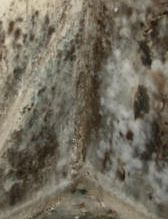 |
| Mold has been linked to respiratory ailments. |
The mold was discovered in the fan coils of air-conditioning units in the center’s domiciliary unit, and patients were moved out Friday. Many are being housed in Martinsburg area hotels during clean-up efforts, which the VA said will take two months.
In a statement, the VA described the health risk from the mold as “very low.”
Many of the patients residing at the domiciliary unit are enrolled in programs treating substance abuse, homelessness and mental health disorders, according to veterans at the facility.
Several of the patients have been treated for respiratory ailments that may be related to the mold, according to the VA employee and residents. A female patient complained several times about mold in her room before it was inspected, they said. “That’s what finally got the ball rolling,” the employee said.
The Martinsburg facility provides care to veterans in West Virginia, Maryland, Virginia and southeastern Pennsylvania.
Source: The Washington Post
Remove mold spores and other contaminants from the air
Buildings suffering from mold can be detrimental to health. Most cases require professional mold remediation services to treat the problem effectively.
Before during and after treatment, indoor air quality may suffer due to airborne mold spores, harsh chemicals and other IAQ contaminants.
With adequate ventilation and efficient indoor air cleaners, patients and staff may be able to breathe cleaner and healthier air.
 |
| The RAP cleaner can accommodate all 3 filters. |
Electrocorp has designed portable as well as ductable indoor air cleaners that feature a high-efficiency air filter system, containing
- Large activated carbon wall for gases, odors, fumes and chemicals
- HEPA filter to remove at least 99.97% of airborne particles 0.3 microns in diameter
- UV germicidal filtration to neutralize airborne mold spores, bacteria and viruses
Contact Electrocorp for more information and ask about the air cleaners for hospitals and health-care centers.
No comments:
Post a Comment